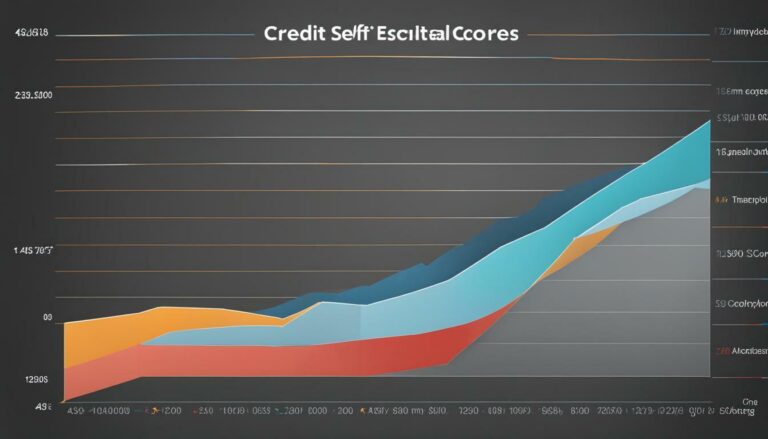Understanding Credit Scores and Societal Pressures Today

In today’s society, credit scores and the societal pressures surrounding them play a significant role in shaping financial decisions and overall financial health. It is essential to have a clear understanding of credit scores and actively manage them to ensure creditworthiness and financial well-being.
- Credit scores and societal pressures have a direct impact on an individual’s financial health.
- Understanding credit scores is crucial for managing creditworthiness and accessing loans and credit cards.
- Societal expectations and peer influence can contribute to financial stress.
- Emerging trends like the use of social data in creditworthiness assessments raise concerns about privacy and free speech.
- The future of credit scores and societal pressures may involve the development of a soft social credit system and the use of digital currencies.
The Impact of Credit Scores on Financial Health
Your credit score has a profound impact on your financial health, influencing your ability to secure loans, obtain credit cards, and obtain favorable interest rates. It serves as a measure of your creditworthiness, indicating how responsible you are with managing debt and meeting financial obligations. A high credit score signifies a history of timely payments and responsible credit management, making lenders more likely to approve your loan applications and offer lower interest rates.
On the other hand, a low credit score can limit your financial options and lead to higher interest rates. Lenders may view you as a higher credit risk, making it more difficult to obtain loans or credit cards. Even if you are approved, you may face higher interest rates, resulting in increased borrowing costs over time.
| Impact of Credit Scores | High Credit Score | Low Credit Score |
|---|---|---|
| Access to Loans and Credit Cards | Easy approval and favorable terms | Limited access and higher interest rates |
| Interest Rates | Lower interest rates | Higher interest rates |
| Creditworthiness | Perceived as responsible borrower | Perceived as higher credit risk |
Managing societal expectations around credit is also crucial for maintaining financial health. In today’s society, there is often pressure to live up to certain standards and maintain a certain lifestyle, which can lead to overspending and accumulating debt. It’s important to resist the temptation to spend beyond your means and prioritize financial stability and long-term goals.
🚨 TUIC Errors + Low Credit Score?
CreditScoreIQ helps you build credit faster by reporting utility bills to all 3 bureaus—while you dispute errors.
Start Building Credit Today →By understanding the impact of credit scores on your financial health and managing societal expectations, you can take proactive steps to improve your creditworthiness and maintain a healthy financial future. This includes consistently making payments on time, keeping credit card balances low, and monitoring your credit report for any errors or inaccuracies. It’s also essential to develop good financial habits, such as budgeting and saving, to ensure long-term financial well-being.

Financial literacy plays a vital role in navigating the complexities of credit management and societal pressures. It empowers individuals to make informed financial decisions, understand the impact of credit scores, and resist unnecessary financial temptations. By educating yourself on financial concepts, developing good money habits, and seeking professional advice when needed, you can confidently manage your credit health and achieve your financial goals.
Societal Pressures and Financial Stress
Society places significant expectations on individuals when it comes to credit scores, and these pressures can lead to financial stress and strain. Many people feel the need to maintain high credit scores to meet social expectations and gain approval from peers. This can create a constant fear of falling short and facing judgment.
Moreover, societal pressures can influence credit-related decisions, such as taking on more debt than necessary or overspending to maintain a certain lifestyle. Peer influence and the desire to fit in often drive individuals to make financial choices that may not align with their actual needs and capabilities.

These pressures can have serious repercussions on an individual’s financial well-being. The burden of debt coupled with trying to meet societal expectations can lead to anxiety, depression, and a constant sense of financial insecurity. It becomes a vicious cycle that can be difficult to break free from.
It is important for individuals to recognize and manage these societal pressures effectively. Taking control of one’s financial situation, setting realistic goals, and focusing on personal financial well-being rather than external validation can help alleviate some of the stress. Seeking support from financial professionals or credit counseling services can also provide guidance and assistance in navigating societal pressures and building a healthier relationship with credit.
Emerging Trends: Social Data and Creditworthiness
With the advent of technology, creditworthiness assessment has expanded beyond traditional factors, with some credit companies utilizing personal data from social networking sites to evaluate creditworthiness. This includes analyzing social media activity, online shopping behavior, and even the types of connections individuals have. By using this social data, credit companies aim to gain a more comprehensive understanding of an individual’s financial behaviors and predict credit behavior more accurately.
This trend raises concerns about privacy and the potential misuse of personal data. While the use of social data can provide valuable insights into an individual’s financial profile, it also raises questions about the fairness and accuracy of such assessments. Critics worry that this approach could result in discriminatory practices, as social media presence may not accurately reflect an individual’s creditworthiness or financial responsibility.
Moreover, the idea of using social data to determine creditworthiness brings up important ethical considerations. It raises questions about the potential for censorship and the restriction of free speech. If credit decisions are based on an individual’s political beliefs or behavior, it could lead to unfair treatment and the infringement of civil liberties.

Looking ahead, the development of a “Digital Dollar” and the rise of cryptocurrencies could provide alternative means of transaction for individuals facing restrictions based on creditworthiness. These digital currencies offer the potential for decentralized, borderless transactions, enabling individuals to engage in financial activities outside traditional banking systems. However, the widespread adoption of digital currencies also presents challenges, such as regulatory frameworks and security concerns.
As technological advancements continue, it is crucial to strike a balance between leveraging new data sources and protecting privacy and civil liberties. The growth of algorithms and tech giants has the potential to result in unprecedented levels of tracking, censoring, and punishing ordinary citizens. To navigate these emerging trends, individuals should prioritize financial literacy and stay informed about their rights and responsibilities in the digital age.
The Future of Credit Scores and Societal Pressures
Looking ahead, the future of credit scores and societal pressures raises questions about the potential growth of a soft social credit system and the use of cryptocurrencies as alternative transaction methods. As credit companies continue to explore new ways of assessing creditworthiness, personal data from social networking sites is being considered. This innovative approach aims to gauge an individual’s credit behavior based on their online activities and connections. While it may offer a more comprehensive view of an individual’s financial habits, concerns about privacy and data security arise.
Furthermore, the concept of a soft social credit system presents a scenario where individuals could face restrictions on platforms or transactions based on their political beliefs or behavior. This potential development raises concerns about censorship and the restriction of free speech. As algorithms and tech giants play an increasing role in our lives, the potential for ordinary citizens to be tracked, censored, and punished raises ethical questions.
“Without pushback, the growth of algorithms and tech giants could lead to a mindboggling level of tracking, censoring, and punishing ordinary citizens by 2030.”
Amidst these concerns, the emergence of cryptocurrencies and the concept of a “Digital Dollar” provides an alternative means of transaction for individuals facing restrictions. Cryptocurrencies offer decentralized and borderless transactions, promising greater financial inclusion and autonomy. However, their adoption comes with challenges related to regulation, security, and stability. The potential for a digital currency revolutionizes traditional financial systems and could disrupt the current credit landscape.

| Concerns | Potential Solutions |
|---|---|
| Censorship and restriction of free speech | Advocate for data privacy regulations and digital rights protection. |
| Privacy and data security | Implement robust security measures and transparency in data handling. |
| Regulation and stability of cryptocurrencies | Establish regulatory frameworks, educate users, and promote responsible cryptocurrency usage. |
As we navigate the future of credit scores and societal pressures, it is crucial to strike a balance between technological advancements and protecting individuals’ rights. It is essential to actively participate in discussions surrounding creditworthiness assessment, privacy, and digital rights to ensure fair and inclusive financial systems.
Conclusion
In conclusion, understanding credit scores and navigating societal pressures is crucial for maintaining financial health and managing societal expectations in today’s world. It is important to recognize that credit scores play a significant role in determining creditworthiness and access to financial opportunities. By managing credit effectively, individuals can improve their financial standing and secure favorable interest rates on loans and credit cards.
However, societal pressures surrounding credit scores can contribute to financial stress. The influence of social expectations and peer pressure can lead individuals to make credit-related decisions based on external validation rather than their own financial well-being. It is essential to be mindful of these pressures and make informed choices that align with one’s financial goals and values.
Emerging trends in creditworthiness assessment, such as the use of social data and personal information from social networking sites, pose both opportunities and challenges. While these practices may provide a more holistic view of an individual’s credit behavior, they also raise concerns about privacy and potential bias. Financial literacy becomes increasingly essential in navigating societal expectations and understanding the potential impact of these trends on one’s credit management.
Looking ahead, the future of credit scores and societal pressures remains uncertain. The concept of a soft social credit system, where individuals could face restrictions based on their political beliefs or behavior, raises concerns about censorship and the restriction of free speech. On the other hand, the development of a “Digital Dollar” and the use of cryptocurrencies could provide alternative means of transaction for individuals facing restrictions. It is important for individuals to stay informed and actively engage in discussions surrounding these developments.
FAQ
Q: What is the average credit score in the U.S.?
A: The average credit score in the U.S. has remained unchanged at 714.
Q: Has the average total debt per consumer increased?
A: Yes, the average total debt per consumer has increased driven by inflation and increased demand for goods and services.
Q: Are credit companies using personal data from social networking sites to assess creditworthiness?
A: Yes, some credit companies are utilizing personal data from social networking sites to assess creditworthiness.
Q: Is social data being used to predict credit behavior?
A: Yes, some credit companies are exploring the use of social data to predict credit behavior.
Q: What is a soft social credit system?
A: A soft social credit system is a potential system where individuals could be blocked from using certain platforms or conducting transactions based on their political beliefs or behavior.
Q: How could the use of cryptocurrencies provide an alternative means of transaction?
A: The use of cryptocurrencies, such as a potential “Digital Dollar,” could become alternative means of transaction for those facing restrictions in the future.
Q: What concerns are raised by the growth of algorithms and tech giants?
A: The growth of algorithms and tech giants could lead to a mindboggling level of tracking, censoring, and punishing ordinary citizens by 2030, raising concerns about privacy and restriction of free speech.
Ready to Improve Your Credit?
Disputing TUIC errors is step one. Step two? Boost your score by reporting utility payments with CreditScoreIQ.
Get Started Now (Only $1 Trial) →3-bureau reporting • $1M identity insurance • Dark web monitoring






